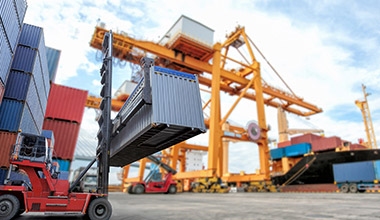
CIF or Cost, Insurance, and Freight, is the term in foreign trade requiring the seller to pay all costs, insurance, and freight to bring goods to a port of destination. CIF places the cost and risk of getting goods to port from the supplier side, where they must be loaded aboard a vessel.
Under a CIF agreement, the price covers the seller’s expenses for bringing the goods to the ship (the contract of shipment) at the port of shipment. This involves includes packing, charges for loading, and all other expenses up to this point.
The seller must obtain insurance for the goods during transit. At least some kind of protection against loss or damage in transit must be met by the insurance. This makes sure financial solutions are there whenever any of those disasters occur while shipping.
Freight are the embodied shipping or carrying costs required to ship goods sal from one place to another. In the case of CIF, the seller incurs the expenses of freight charge to move the cargo from their place of origin to the destination port identified by the buyer.
For buyers who want to avoid hassle-free shipping logistics and insurance details, CIF can be a plus point. You only have to think about receiving goods, and you do not need to be worried about transport arrangements and other risks of goods in transit; it simplifies the transactions. Moreover, it serves as a security net via an insurance policy organized by the vendor.
FOB stands for Free on Board. A commercial international term means the seller has fulfilled their obligation only when goods are loaded on a ship at a specified port. From this moment forward, the buyer assumes all costs and risks of transport.
When using FOB, sellers take all costs until goods are loaded onto a vessel at the port of shipment. Thereafter, buyers assume responsibility for freight charges, unloading fees of destination ports, customs clearance costs as well as the eventual delivery charges.
The transfer of risk in a FOB agreement occurs when goods pass over the ship’s rail at the port of shipment. At this point, any subsequent loss or damage becomes the buyer’s responsibility.
FOB offers greater control for buyers who wish to manage their own logistics and transportation arrangements. It allows buyers to choose their preferred carriers and negotiate competitive rates directly with shipping companies. This flexibility can result in cost savings and more efficient supply chain management.
In CIF agreements, sellers are responsible for covering transportation costs up to the destination port. In contrast, under FOB terms, buyers assume these expenses once goods have been loaded onto a vessel at the origin port.
CIF places liability on sellers until goods arrive at their destination port, providing assurance against potential transit risks for buyers. Conversely, under FOB conditions, risk shifts to buyers immediately after loading occurs at the departure point.
CIF simplifies transactions by allowing sellers to handle all logistical aspects while offering protection against unforeseen events during transit—ideal for less experienced importers seeking minimal involvement in shipping processes. Meanwhile, seasoned importers may prefer FOB due to its flexibility which enables greater control over supply chain operations through direct engagement with service providers like carriers or insurers.
| Aspect | CIF | FOB |
| Mode of Transportation | Primarily used for sea transport | Suitable for various modes including sea or air |
| Transportation Arrangements | The seller arranges the entire shipment | The buyer arranges post-loading transport |
| Delivery of Goods | Delivered upon arrival at the destination port | Delivered upon loading onto the vessel |
| Payment | Payment includes cost plus insurance & freight | Payment excludes post-loading transport fees |
| Risk Transfer | Risk remains with the seller until arrival at the destination | Risk transfers upon loading |
CIF might be more appropriate for companies that embrace simplicity and seek to mitigate risks as it holds the seller responsible for logistics management functions. This can be a significant benefit, especially for smaller companies or companies that lack extensive shipping experience as it can allow them to concentrate on their main business, while also making sure goods are insured in transit.
On the other hand, companies that want more control over their supply chain may opt for FOB. When goods are loaded onto the vessel, the buyers take responsibility for transportation and can choose which carrier to use and negotiate the best freight rates. This method can result in lower costs and greater logistical efficiency, particularly for companies with contracts in play with shipping companies or enterprises that are equipped to handle complex international logistics.
Industry norms and practices significantly influence the choice between CIF and FOB. Certain sectors may have established preferences based on historical trends or regulatory requirements. For example, industries dealing with bulk commodities often favor CIF due to the predictability of costs and insurance coverage. Conversely, technology or high-value goods sectors might lean towards FOB to maintain control over shipping schedules and carrier selection. Understanding these industry-specific preferences can help businesses align their strategies with market expectations.
CIF and FOB have different sets of contractual responsibilities, which changes how the parties will perform their obligations. Under CIF contracts, costs up to the place of destination, including insurance, are borne by the sellers. It is up to buyers to make sure it’s fully ready to clear customs when it lands where it lands. On the other hand, FOB contracts place responsibility on the buyer as soon as goods are loaded onto the ship at the port of shipment. This means that all parties must carefully delineate their responsibilities to avoid conflict.
It is essential to adhere to international trade regulations when using either CIF or FOB terms. Documentation All documentation should comply with the regulatory requirements for import/export within a nation. This involves correct value of goods declarations, compliance with customs processes, and compliance with related rights and obligations under applicable trade and sanctions law.

X Sourcing is a leading Sourcing company, specializing in customized solutions for international trade companies. X Sourcing owns a large network of global sourcing agents covering many continents and different industries — manufacturing, retail, technology, etc.
X Sourcing plays a vital role in helping businesses assess market conditions before choosing between CIF and FOB terms. By analyzing factors such as shipping routes, carrier reliability, geopolitical risks, and currency fluctuations, sourcing companies provide valuable insights that inform strategic decisions related to international trade agreements.
X Sourcing has a one-stop full service that makes global sourcing easy for customers. Whether you are looking for trustworthy suppliers, or distributing arrangements under CIF and FOB terms, X Sourcing guarantees contact at each step of the way. X Sourcing guarantees coordination during every procurement stage, from identifying reliable suppliers to managing logistics arrangements under CIF and FOB terms.